Duncan Sheik: More than barely breathing
 When I used to work as a clerk-gal / shelf-stocker / sweep-if-they-need-it person at Longs’ Drug Store in San Jose, I remember that they used to play a lot of Duncan Sheik over the PA (along with Del Amitri and other soft-pop hits. Maybe “On The Wings Of Love” too). In fact, Sheik’s 1996 song “Barely Breathing” was apparently the most-played radio song that year. I guess there’s nothing wrong with that tune, but for me it just became background music.
When I used to work as a clerk-gal / shelf-stocker / sweep-if-they-need-it person at Longs’ Drug Store in San Jose, I remember that they used to play a lot of Duncan Sheik over the PA (along with Del Amitri and other soft-pop hits. Maybe “On The Wings Of Love” too). In fact, Sheik’s 1996 song “Barely Breathing” was apparently the most-played radio song that year. I guess there’s nothing wrong with that tune, but for me it just became background music.
All this to say, I didn’t realize the depth of Duncan Sheik’s talent in producing richly multifaceted music that has some serious quality behind it. In the last few years, I’ve opened my mind a little more and been exposed a few of his other tunes which underscore his ability to craft these gorgeous symphonic songs with penetrating lyrics. (His tribute song to Jeff Buckley is astounding, as is “In Between” from 1998′s Humming, among others). Perhaps you, like me, had erroneously dismissed Duncan Sheik as boring or overly-vanilla, and maybe you missed his contributions to the Repertoire Of Good Music?
From an early age, Sheik was schooled in piano by his grandmother, a Juilliard graduate. He continued in music through his school years, but graduated with a degree in Semiotics from Brown University (trivia fact, same program as Damian Kulash from OK Go). Semiotics is the study of language, communication, and semantics — so I think it leads to some dang good songwriting.
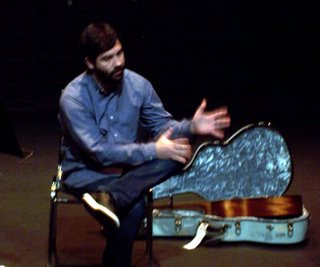 Recently when I was in California, I stumbled by chance upon a sort of “MTV Unplugged” lunchtime session with Sheik in the Fess Parker Theater at my university. This hour-long conversation was peppered with audience questions and several acoustic performances of songs that Sheik has penned for his current musical theater endeavor, Spring Awakening.
Recently when I was in California, I stumbled by chance upon a sort of “MTV Unplugged” lunchtime session with Sheik in the Fess Parker Theater at my university. This hour-long conversation was peppered with audience questions and several acoustic performances of songs that Sheik has penned for his current musical theater endeavor, Spring Awakening.
This musical was performed at Santa Clara University last year, hence the connection and the resulting (very interesting) appearance. It is a re-imagining of a controversial German expressionist play by the same name from Frank Wedekind, and Sheik worked on the musical score for the past eight years before it finally opened in New York’s Atlantic Theater this past August, and just arriving on Broadway this past weekend.
Here is a partial transcript of the “interview” portion with the audience. I related to much more of what he had to say than I thought I would, being from a completely NON-theatre background myself (except for that junior high stint in the Anne Of Green Gables play, which I totally rocked). I always find it fascinating to see how music can permeate so many aspects of life and culture.
DUNCAN SHEIK, “UNPLUGGED”
October 20, 2006
Fess Parker Theater, Santa Clara University
Sheik opened with acoustic performances of two exceedingly lovely songs from the musical.
BLUE WIND
THE SONG OF PURPLE SUMMER
Q&A
How has it been working in theatre, which is so much more collaborative than the individual songwriting model? I imagine it must be a struggle to find solitude sometimes.
Yeah, yeah. Well, I lock people out of my house all the time. We lock the director [Michael Mayer] out of the recording studio, he’ll be banging on the door (laughs).
But I do think that in the end, it’s really great to have people’s ideas in the process because left to our own devices, [lyricist] Steven [Sater] and I — the whole show would just sound like what you’ve just heard, it would just be completely sad and melancholy and tragic, and it would not be very exciting. Having other people to force us to give the songs more energy — in the end that’s very helpful.
How did you get into the theatrical process, and how do you think it changed your writing and the concept of what a song is to go from a world recording albums to the theater?
Initially it was very difficult for the reasons I was saying, where it was so much more collaborative. When I go into the studio, I have great people around me who all give really great ideas, but at the end of the day it’s still my record so I can make the call at the end. But in the theater scenario . . . you kind of have to be political and negotiate things all the time for what your agenda is versus their agenda.
I mean, the initial thing that was exciting about the project was that, normally, being on tour and playing with four or five musicians every night is a great thing, but there is some limitation to it. You know, five guys, on stage, playing some songs. That’s what happens when you go to a rock concert. For me, it was very exciting to think that there could be this really cool narrative that you’re telling over the course of the evening, and that within the context of this story, you’re using this music to up the emotional ante of that story.
So even though sometimes it was really painful and really difficult to hear these songs — you know, I’ll be really honest with you, we had some kids who were really very “Broadway” in the initial workshops, and even some of the kids who are in the show now, they’ve done Les Mis and Ragtime and things like that. So they sing in that way, and — it was torture for me. I had to kind of crack the whip with them, “You’re not Cosette, you’re Fiona Apple.” You know, “Pretend that you’re Thom Yorke. You’re a kid in your bedroom who wants to be a rockstar.”
So the concept was that the music would be completely contemporary and modern, and it was a difficult process to get to that place. And in the end I think it did end up as kind of a hybrid, because whenever you have eleven people singing a song on stage, there is an aspect of musical theatre around it, I mean — you can’t get away from it.
But I think in a way, I’ve kind of come around a little bit and started to embrace some aspects of [musical theatre]. We started working on this almost eight years ago, and since then I’ve come to appreciate the genre a lot more. For example, seeing things like Dancer In The Dark, the Bjork movie, seeing how music can function there. Laurie Anderson did a great musical piece about Moby Dick and — to see all these kinds of possibilities within the form that are really cool. So even though it was difficult and a lot of the times I just wanted to say “Ugh! I can’t do this!” in the end, to see it on the stage at The Atlantic, it was the best and most satisfying creative feeling I’ve had. Ever.
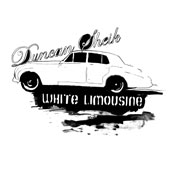 [My question] Do you think that the experiences working with Spring Awakening affected your writing on White Limousine at all?
[My question] Do you think that the experiences working with Spring Awakening affected your writing on White Limousine at all?
Yeah, I think it definitely did. I think anytime you work on your process in a different way –like, say, working with eleven singers instead of one– it changes the way you think about harmony, vocals, what the possibilities are. And I think also lyrically, it changed a lot of the ways I think about writing songs. Steven [Sater] is a lot more of a poetic writer than I am — I can tend to get more heady in my own writing, and so I think it’s helped me move away from that intellectual writing zone and to just do something that’s more about feeling.
How was it working with this project which had existing themes and lyrics that you had to include in your songwriting, and integrating them with the melodies or chords in your mind?
Actually, I tend to write chords first almost always and then the melodies kind of reveal themselves from that. But that’s just my own personal thing, I’m not sure why that is. I’m not the kind of person that just walks about and a melody pops into my head, I’m definitely a person that hears structural things first and then the melodies kind of emerge. The lyrics do suggest a rhythmic thing no matter what, so that kind of gives you something to start with in this instance.
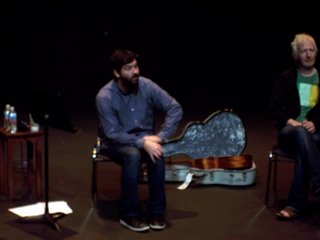
Do you see yourself continuing to work in musical theatre?
Yeah. Steven and I have a bunch of pieces coming up. We have a show called The Nightingale which is going to be done in La Jolla next fall, and it’s based on the Hans Christian Andersen fairytale about a Chinese emperor and this great bird . . . it’s actually a little bit more political, a piece about how the aristocracy within a given country can really ignore the needs of the common people. And then we also did a piece about Nero the emperor that was in the theatre a few months ago and we’ll probably do another version of that in New York next year as well.
And finally our next big crazy idea is to do a version of Frankenstein — but it would be not with the big green monster. Our idea is to have Mary Shelley and Percy Bysshe Shelley and Byron, the three of them kind of sitting around telling stories on the shore of Lake Como, and the story of Frankenstein comes from their perspectives there. So lots of things in the works.
Johnny Depp has been rumored to play Sweeney Todd in a new movie musical — how would you feel about Spring Awakening being made into a movie?
Oh we definitely want to make a movie of it, for sure. It’s gonna be hard, as all of these things are. Between you and me, most musicals which are made into movies are not very successful — at least artistically I find them to be off-putting. But there are some things that are cool, so it can be done, if we get the right team of people to make this movie so that it doesn’t get too . . . Hollywood and too . . . stupid.
How has it been orchestrating your works for the musicians in the theatre? Has your process changed much from how you are used to doing it?
I made recordings of pretty much all of these songs before, so there were orchestral parts that I had written that existed on the recordings already. But I also collaborated with Simon Hale, who’s the string arranger that I work with a lot, he actually just got involved with the project and he did string arrangements for 14 of the 20 songs. We just recorded these 14 string arrangements at my studio this past Tuesday and Wednesday, and he’s amazing. I just sit there and I’m blown away by what he does. So Simon and I have kind of orchestrated it together, and it’s amazing to hear what he comes up with.
You seem to be at a really revolutionary point in musical theatre in terms of reaching out to new audiences, or younger audiences, or those who wouldn’t ordinarily be interested in musical theatre. How do you want to affect this change?
Steven and I have always –from the beginning– been interested in figuring out a way to do a piece of musical theatre and have younger people come to the show, but not just younger people, but people of all ages who kind of grew up in rock music, and yet make them feel like this kind of music is still completely relevant to them.
You know, musical theatre in the ’30s and ’40s, that was the popular music of the day, and then something happened in the ’50s and ’60s where these two genres diverged. It’s always been our goal to kind of bring these two musical forms back together again so that you’ll have a different set of people seeing it. In addition to the regular theatergoers, we’re also hoping to get a new set of people who won’t be estranged by the music because it’s their music, it’s what they’re used to hearing aesthetically.
When the kids are singing in Spring Awakening — even though it’s set in 1891, when they sing they become modern kids. And the conceit is that when they sing they’re never singing to each other, they’re not singing to the audience. It’s similar to Dancer In The Dark; when Bjork is singing she enters this fantasy world, her own kind of internal monologue is happening. So hopefully theatregoers don’t get that uncomfortable or alienating feeling of “Why is this person singing stuff that they should just be saying?“
I think that there’s been a kind of a modern tradition of that in musical theatre that’s always trying to get a foothold, whether it’s Tommy or Rent or Hedwig And The Angry Inch — there have been some successful attempts, but we’re just trying to be part of that trajectory and just get new people into the theatre, I think that’s really important.
***********************
Sheik closed with an acoustic version of the title track off his latest album, White Limousine:
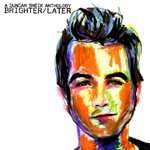 Watch also for the new double-disc retrospective album called Brighter/Later that was just released (with a nod to Nick Drake) on Rhino Records.
Watch also for the new double-disc retrospective album called Brighter/Later that was just released (with a nod to Nick Drake) on Rhino Records.
LISTEN:
At The Reservoir – A Live EP
(1996 US 7-track promo-only CD featuring two non-album tracks)
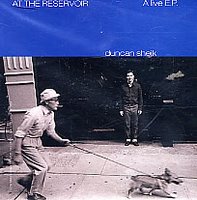 01. The End Of The Outside
01. The End Of The Outside
02. In The Absence of Sun
03. Rubbed Out
04. Home
05. Barely Breathing
06. She Runs Away
07. Fake Plastic Trees (Radiohead cover)
Me with Chris Parnell from SNL Duncan Sheik

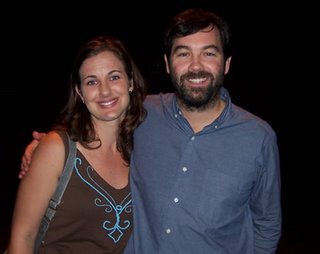


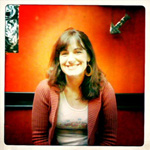 Name: Heather Browne
Name: Heather Browne
Very nice! One of our members found this and posted it at Duncan’s fan message board (www.sheikspeak.com), so I imagine a bunch of us will be checking it out today. Thanks for the nice synopsis and audio/video clips…
swampgirl
Anonymous — November 20, 2006 @ 8:47 am
thanks swampgirl! It’s always the best compliment when the fans of a certain artist re-post a link to my blog in one of their forums and come to visit, hopefully with some feedback and comments from those who know! It was a neat little performance to stumble upon and I left enlightened.
heather — November 20, 2006 @ 8:51 am
My friend, Phil (www.phildonlon.com), featured two of Duncan’s songs in his first short film, Wrestled. They were so perfect I thought they were written for the film! Watch for the film on IFC.
HCJoel — November 22, 2006 @ 8:07 pm
Very interesting, HCJoel. Thanks!
heather — November 22, 2006 @ 8:29 pm
Heather, thanks for sharing more material from this so-talent artist Duncan Sheik. I’ve seen him twice one solo when Fisher opened from him (where is she?) and in 2002 when he opened for Ben Folds. I’ve always enjoyed visiting your blog. It’s very inspiring. Keep it up!
One Died Simply — November 23, 2006 @ 7:41 am
Thanks Heather! This is so great. I’m so glad you could make it and so glad you wrote it all up! Look for the Spring Awakening cast album coming out Dec 12!
Anonymous — November 25, 2006 @ 9:17 pm
(by the way, this is Scotty)
Scotty — November 25, 2006 @ 9:18 pm
Nicely done, Heather. I started listening to Sheik back when Humming came out. His stuff is incredibly mature both musically and lyrically. I got to see him late last year for the first time. Fun show.
Jeff — March 23, 2007 @ 4:47 pm